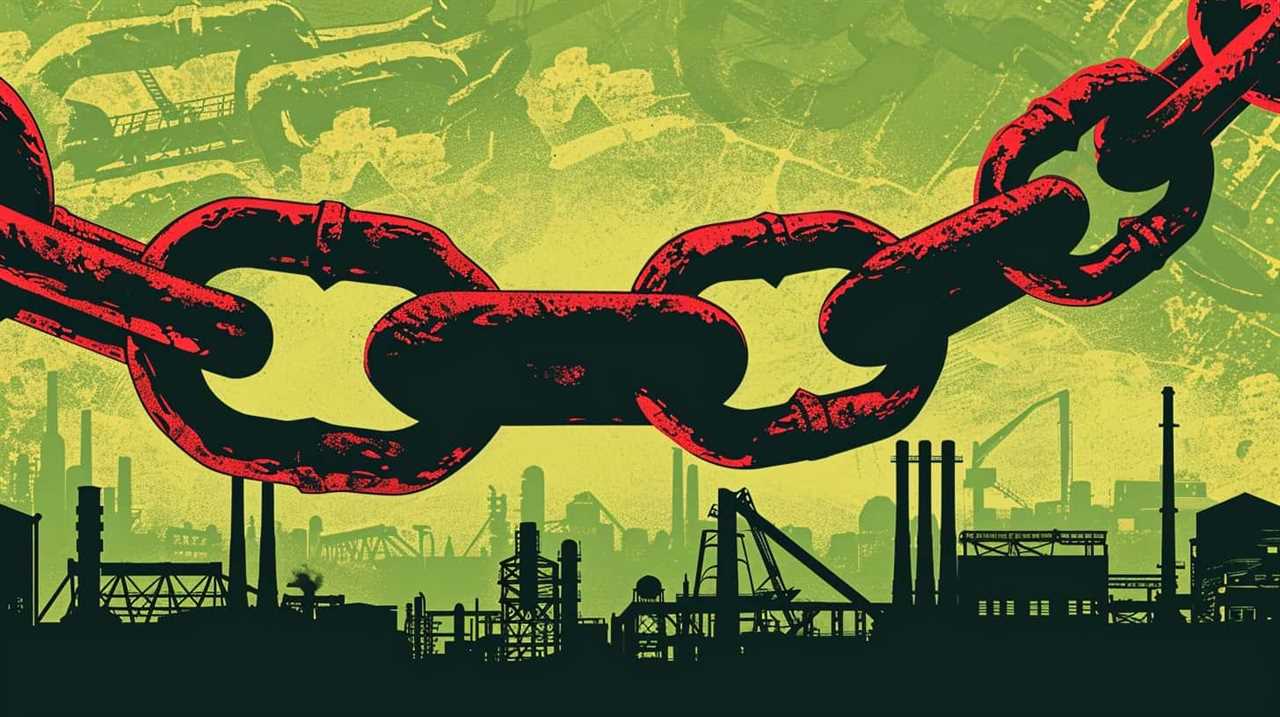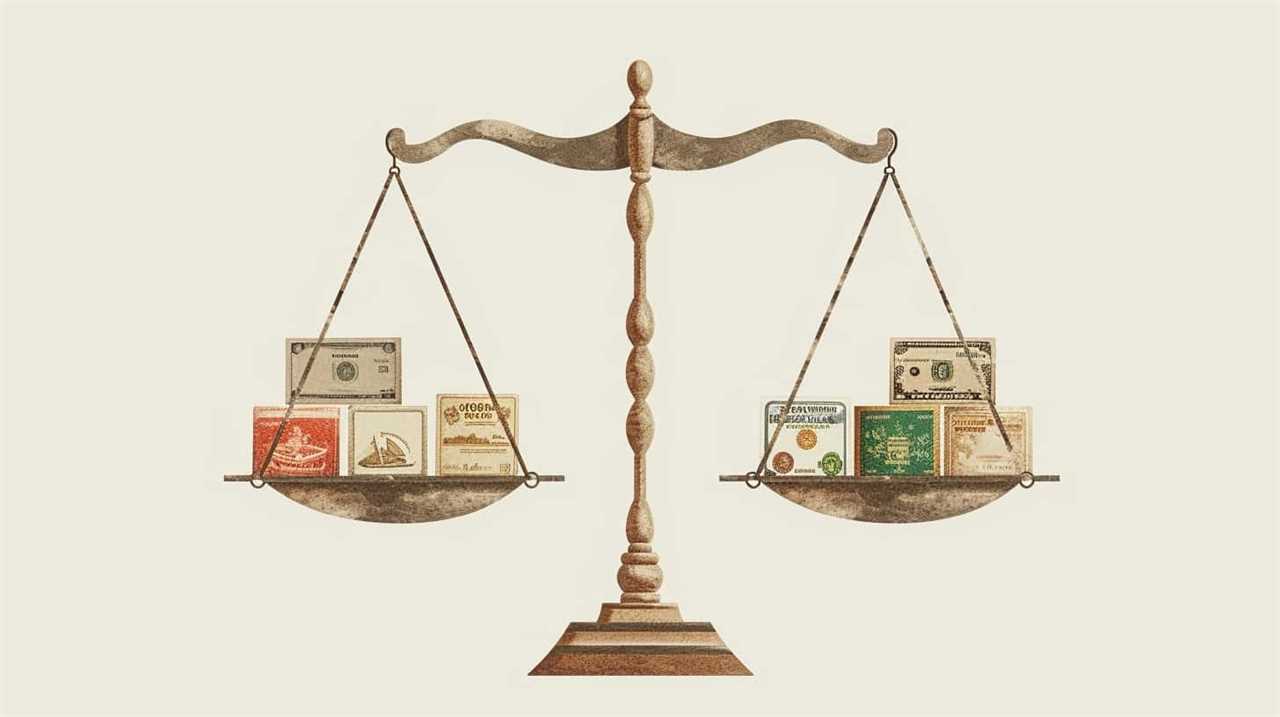Ever thought about the reality behind David Ricardo’s theory of comparative advantage in classical economics? Let’s delve into the realm of innovation and examine Ricardo’s revolutionary contribution.
In this introduction, we will unravel the concept of comparative advantage and its key principles. By understanding the essence of Ricardo’s theory, we can gain insights into how countries can specialize and trade to maximize efficiency and innovation.
We will also delve into case studies that illustrate the real-world applications of comparative advantage. However, it is essential to acknowledge the criticisms and limitations of Ricardo’s theory to fully grasp its relevance in today’s rapidly evolving economic landscape.
So, let’s embark on this enlightening journey to uncover the secrets of Ricardo’s comparative advantage!

Key Takeaways
- Ricardo’s comparative advantage theory is a significant contribution to classical economics.
- It emphasizes the benefits of specialization and trade, leading to increased productivity and higher levels of output and consumption.
- Understanding comparative advantage is crucial for promoting international trade, economic growth, and prosperity.
- While Ricardo’s theory provides a comprehensive framework, it has limitations and may not account for factors like transportation costs, economies of scale, and technology.
Classical Economics Overview
In our overview of classical economics, we’ll explore the fundamental principles and theories that shape our understanding of the market economy. Classical economics emerged in the late 18th century and was highly influential in shaping economic thought for centuries to come.
One of the key critiques of classical economics is its assumption of perfect competition, which critics argue doesn’t accurately reflect the complexities of real-world markets. However, classical economists argue that the principles of supply and demand, as well as the role of self-interest and rational behavior, provide a solid foundation for understanding market dynamics.
Another important aspect of classical economics is the emphasis on the importance of trade. Classical economists, such as Adam Smith and David Ricardo, recognized that trade allows for specialization and the efficient allocation of resources. Ricardo’s theory of comparative advantage, in particular, highlights the benefits of trade between countries with different production capabilities. By specializing in the production of goods in which they’ve a comparative advantage, countries can maximize their overall output and welfare.
David Ricardo’s Contribution
David Ricardo’s contribution to classical economics is significant and revolves around the concept of comparative advantage. His legacy lies in his economic contributions, particularly in the field of international trade. Ricardo’s insights challenged prevailing economic theories of his time and continue to shape our understanding of global commerce.

One of Ricardo’s most influential ideas is the theory of comparative advantage. He argued that countries should specialize in producing goods and services in which they’ve a lower opportunity cost compared to other nations. By doing so, countries can maximize their efficiency and overall output. This theory has profound implications for international trade and has been instrumental in shaping trade policies around the world.
Ricardo’s economic contributions extend beyond international trade. He also explored the impact of taxation on economic growth, advocating for lower taxes on land and labor. Additionally, he made significant contributions to the theory of rent, laying the foundation for the study of land economics.
Comparative Advantage Definition
Let’s explore the definition of comparative advantage in classical economics. Comparative advantage refers to the ability of a country, individual, or firm to produce a specific good or service at a lower opportunity cost than others. It’s a concept introduced by David Ricardo, an influential economist of the 19th century.
The benefits of understanding and applying the concept of comparative advantage are numerous. Here are five key reasons why it’s crucial in economics and innovation:

- Efficient resource allocation: Comparative advantage allows countries to specialize in the production of goods and services they can produce most efficiently, leading to optimal resource utilization.
- Increased productivity: By focusing on producing goods in which they’ve a comparative advantage, countries can enhance their productivity and output.
- Trade expansion: Understanding comparative advantage promotes international trade by encouraging countries to trade goods they produce efficiently for those they do not.
- Economic growth: Comparative advantage enables countries to tap into global markets, driving economic growth and prosperity.
- Innovation and technological progress: Comparative advantage encourages countries to innovate and develop new technologies to enhance their competitive edge in specific industries.
Key Principles of Comparative Advantage
Understanding the key principles of comparative advantage is essential for maximizing economic efficiency and driving innovation. By specializing in the production of goods and services in which they have a lower opportunity cost, countries can benefit from trade and achieve higher levels of productivity. The principles of specialization and the advantages of trade go hand in hand, creating a win-win situation for all parties involved.
To further illustrate these principles, let’s take a look at the following table:
| Country | Wheat (tons) | Cloth (yards) |
|---|---|---|
| Country A | 100 | 200 |
| Country B | 200 | 150 |
| Country C | 150 | 300 |
| Total | 450 | 650 |
In this hypothetical scenario, each country has a different opportunity cost for producing wheat and cloth. Country A has a comparative advantage in producing wheat, as it can produce 1 ton of wheat by sacrificing only 2 yards of cloth. Conversely, Country C has a comparative advantage in producing cloth, as it can produce 1 yard of cloth by sacrificing only 0.5 tons of wheat.
By specializing in the production of the goods in which they have a comparative advantage, countries can trade with each other and achieve higher levels of output and consumption. This leads to increased efficiency, innovation, and overall economic growth.

Transitioning into Ricardo’s theory on trade…
Ricardo’s Theory on Trade
Ricardo’s theory on trade provides a comprehensive framework for understanding the concept of comparative advantage and its impact on international trade. This theory, developed by economist David Ricardo in the early 19th century, revolutionized the way we think about trade and specialization.
Evaluation of Ricardo’s theory reveals its strengths and limitations. While the theory highlights the benefits of specialization and trade, it assumes that resources are fully mobile, which may not always be the case in reality. Additionally, Ricardo’s theory doesn’t account for factors such as transportation costs, economies of scale, or the impact of technology on production.
Despite these limitations, Ricardo’s theory remains a foundational concept in economics. It has paved the way for further research and alternative trade theories, such as the Heckscher-Ohlin model, which considers differences in factor endowments between countries.

Case Studies on Comparative Advantage
In the realm of classical economics, we can explore case studies that exemplify the concept of comparative advantage. These case studies provide real-world examples of how countries can benefit from specializing in the production of goods and services in which they have a comparative advantage.
One famous case study is the trade relationship between Portugal and England during the 18th century. At the time, Portugal had a comparative advantage in producing wine due to its favorable climate and fertile soil. On the other hand, England had a comparative advantage in producing cloth, thanks to its advanced textile industry.
By specializing in their respective industries and trading with each other, both countries were able to increase their overall output and enjoy higher standards of living. Portugal could produce wine at a lower opportunity cost than cloth, while England could produce cloth more efficiently than wine. Through trade, both countries could access goods that would have been too costly or impossible to produce domestically.
This case study supports the economic theories behind comparative advantage, as it demonstrates how countries can benefit from specializing in the production of goods and services in which they have a comparative advantage. By focusing on their strengths and engaging in trade, countries can achieve higher levels of productivity and economic growth.

Criticisms and Limitations of Ricardo’s Theory
One of the criticisms of Ricardo’s theory of comparative advantage is its applicability in the modern economic context. The theory was developed in the context of a static and agrarian economy, and may not fully capture the complexities of today’s globalized and dynamic markets.
Additionally, the theory relies on certain assumptions and simplifications, such as perfect competition and constant returns to scale, which may not hold true in reality.
These limitations call for a careful evaluation and adaptation of Ricardo’s theory to better reflect the complexities of the contemporary economic landscape.
Modern Economic Context
We have observed criticisms and limitations of the comparative advantage theory proposed by Ricardo in the context of modern economics. In today’s world of economic globalization and rapid technological advancement, Ricardo’s theory faces several challenges and limitations. Here are five key criticisms:

- Inequality: Critics argue that comparative advantage can lead to income inequality, as industries that aren’t internationally competitive may decline, causing job losses and widening the wealth gap.
- Environmental concerns: The theory doesn’t account for the environmental impact of producing goods in countries with lax environmental regulations, leading to pollution and resource depletion.
- Labor exploitation: Some argue that comparative advantage can result in the exploitation of cheap labor in developing countries, as firms move production to countries with lower labor costs.
- National security risks: Relying heavily on imported goods can pose risks to national security, as countries become dependent on others for essential products.
- Technological disruption: The impact of technology on comparative advantage is often overlooked, as automation and digitalization can significantly alter the dynamics of comparative advantage.
These criticisms highlight the need for a more nuanced understanding of comparative advantage within the modern economic landscape.
Unrealistic Assumptions and Simplifications
From our perspective, certain unrealistic assumptions and simplifications in Ricardo’s theory of comparative advantage have been identified as key criticisms and limitations.
While Ricardo’s theory provides a useful framework for understanding international trade, it’s important to acknowledge its shortcomings.
One unrealistic assumption is that there are only two countries and two goods involved in trade, which oversimplifies the complexities of the real world.

Additionally, the theory assumes that resources are perfectly mobile between industries within a country, which isn’t always the case in reality.
Moreover, it assumes constant returns to scale and doesn’t consider factors such as transportation costs and government interventions.
These unrealistic assumptions and simplifications limit the applicability of Ricardo’s theory in the modern economic context.
Nonetheless, it still provides valuable insights into the benefits of specialization and trade.

Transitioning to the next section, let’s explore the relevance of comparative advantage today.
Relevance of Comparative Advantage Today
When considering the relevance of comparative advantage today, it’s important to acknowledge the benefits of global trade and economic specialization.
Global trade allows countries to access a wider range of goods and services, leading to increased consumer choice and lower prices.
Additionally, economic specialization enables countries to focus on producing goods and services in which they have a comparative advantage, leading to increased efficiency and productivity.

These factors highlight the continued importance of comparative advantage in shaping modern economies.
Global Trade Benefits
In the context of Ricardo’s Comparative Advantage in Classical Economics, the relevance of global trade benefits can be seen through the lens of the advantages it brings to various countries. Global trade benefits include:
- Increased efficiency: By specializing in the production of goods and services that they’ve a comparative advantage in, countries can produce more efficiently and at lower costs.
- Expanded markets: Global trade allows countries to access larger markets, increasing their potential customer base and leading to increased sales and profits.
- Economic growth: By engaging in global trade, countries can tap into the global market and benefit from increased demand for their products, leading to economic growth and development.
- Technological innovation: Global trade encourages countries to innovate and develop new technologies to stay competitive in the global market, driving technological advancements.
- Cultural exchange: Global trade promotes cultural exchange as countries interact and learn from each other, fostering creativity and diversity.
These global trade benefits highlight the importance of economic specialization, which we’ll explore further in the subsequent section about the advantages of economic specialization.
Economic Specialization Advantages?
Let’s delve into the advantages of economic specialization and its relevance in today’s understanding of Ricardo’s Comparative Advantage in Classical Economics. Economic specialization refers to the concentration of production on specific goods or services that a country or region can produce more efficiently than others. This specialization allows countries to focus on their strengths and allocate resources more effectively, leading to increased productivity and economic growth.

One of the key advantages of economic specialization is trade. By specializing in the production of certain goods or services, countries can trade with each other and benefit from the differences in their comparative advantages. This leads to increased efficiency, as countries can obtain goods or services at a lower cost than if they were to produce them domestically. Additionally, trade allows for the exchange of knowledge, technology, and ideas, fostering innovation and economic development.
In today’s globalized world, economic specialization continues to play a crucial role in international trade. It enables countries to harness their unique strengths and participate in a global division of labor, creating opportunities for growth and prosperity. As technology advances and markets become increasingly interconnected, the relevance of economic specialization and the trade advantages it offers are more prominent than ever.
Frequently Asked Questions
How Did Classical Economics Shape the Development of Economic Thought?
Classical economics, with its development theories and focus on economic growth, shaped the development of economic thought by providing a framework for understanding how societies can achieve prosperity through specialization and trade.
How Did David Ricardo’s Contribution to Classical Economics Impact the Field?
David Ricardo’s influence on classical economics had a profound impact on the field. His insights into comparative advantage revolutionized how we understand trade and specialization, driving economic innovation and growth.

What Are Some Examples of Countries or Industries That Have Successfully Utilized Comparative Advantage?
Successful examples of utilizing comparative advantage include countries like China and industries like technology. These examples demonstrate the impact on development by allowing countries and industries to specialize in what they do best, leading to economic growth and innovation.
What Are Some Alternative Theories to Ricardo’s Theory on Trade?
Alternative theories to Ricardo’s theory on trade include the Heckscher-Ohlin model, New Trade Theory, and the Gravity model. These theories provide different perspectives, address limitations, and offer modifications to enhance the applicability of trade theory in today’s globalized world.
How Does Comparative Advantage Affect Global Trade Patterns and Economic Inequality Today?
Comparative advantage shapes global trade patterns by encouraging countries to specialize in producing goods they can produce most efficiently. This can lead to economic inequality, as some countries benefit more from trade than others.
Conclusion
In conclusion, Ricardo’s theory of comparative advantage, while widely accepted in classical economics, may not be as flawless as it seems.

Yes, it promotes specialization and global trade, but it fails to account for factors like environmental sustainability and income inequality.
It’s almost as if the theory conveniently ignores the negative externalities and social costs that come with unrestricted free trade.
Perhaps it’s time we start questioning the blind faith we’ve in Ricardo’s theory and explore alternative approaches to global economic relations.









